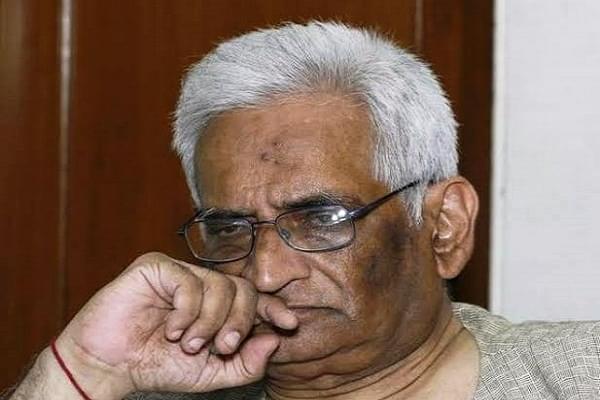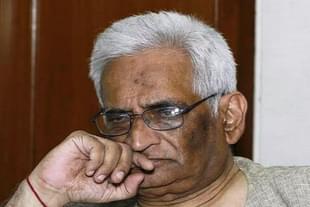News Brief
Fighting To Keep Illegal Rohingyas In India, Rampaging During Ram Mandir Case: Meet Advocate Rajeev Dhavan
Swarajya Staff
Oct 16, 2019, 05:44 PM | Updated 05:44 PM IST
Save & read from anywhere!
Bookmark stories for easy access on any device or the Swarajya app.


The last day of the Ram Janmabhoomi case in the Supreme Court resulted in dramatic scenes when the lead advocate for the Muslim side - Rajeev Dhavan tore up documents and maps which were presented by the Hindu Mahasabha during the course of the hearing.
The lawyer for Hindu Mahasabha Vikas Singh presented a book authored by Kunal Kishore titled Ayodhya Revisited which puts forth the location of Lord Ram’s birthplace on the piece of land where Babri’s ruins currently stands.
This book incensed Rajeev Dhavan who after vehemently opposing its admission as evidence proceeded to tear it up. Even after an aghast Chief Justice tried to get him to stop, Dhavan continued this act.
This led the CJI to exclaim in anger, “ We could just get up and walk out”.
Despite facing rebuke, Dhavan decided to brazen it out by claiming that he merely wanted to throw the pages of the book away but “received permission from the CJI to tear them”.
Just a couple of days ago he had created a flutter when he had remarked that Mughal king Aurangzeb was “one of the most liberal rulers”. Aurangzeb is well known for destroying scores of Hindu temples and persecuting Hindus.
So Who Is Rajeev Dhavan
A senior advocate, Rajeev Dhavan also doubles up as a human rights activist and a Commissioner of the International Commission of Jurists. Born in 1948, Dhavan has studied law at Allahabad University, Cambridge and London University. He has also been a faculty at various foreign institutions.
Despite his illustrious academic career, Dhavan has been no stranger to controversy.
Arguments With Chief Justices’
In his long legal career, Dhavan has been no stranger to controversy. He became well known for his tiff with former chief justice T S Thakur in Sahara SEBI case.
He decided to continue his legacy of fighting with Indian chief justices when he wrote to Dipak Misra announcing that he had decided to give up court practice. He decided to take this step following the conclusion of Delhi statehood case which saw heated exchanges between him and the ex-CJI.
“You go on shouting. You are always like that. We will give our judgement”, CJI said to Dhavan which angered the latter.
The CJI had later referenced to Dhavan by commenting that a small group of lawyers while raising their voice in court should know that “raising the voice means either the lawyer is incompetent to present the case or he is inadequately prepared with the case”.
In case of CJI T S Thakur, Dhavan’s client Subrata Roy had suffered seriously after a livid Thakur had cancelled a parole cancelled to Roy over Dhavan’s conduct in the court.
After taking objection to Dhavan’s arguments in the court Thakur had remarked that, “there are some senior advocates who are disrespectful to the court and play with its dignity. It was very unfortunate”.
“One may be very eloquent, scholarly but that doesn't mean he can browbeat the court. You should present your case politely. There should be threshold of tolerance”, added the former CJI.
The matter escalated to such an extend that Dhavan’s fellow counsel Kapil Sibal had to tender an unconditional apology on his behalf. Dhavan though refused to apologise on his own accord.
Fighting For Illegal Rohingyas
A couple of years ago, with the Narendra Modi led Central government deciding to deport illegal Rohingyas residing in the country, two Rohingyas decided to petition the Supreme Court.
Their cause was supported by various top lawyers of the country which included Rajeev Dhavan. Later, the National Human Rights Commission (NHRC) intervened on behalf of the “Rohingyas refugees” and employed the services of Dhavan.
He though was later removed as its counsel and blamed “circumstances” for this decision.





